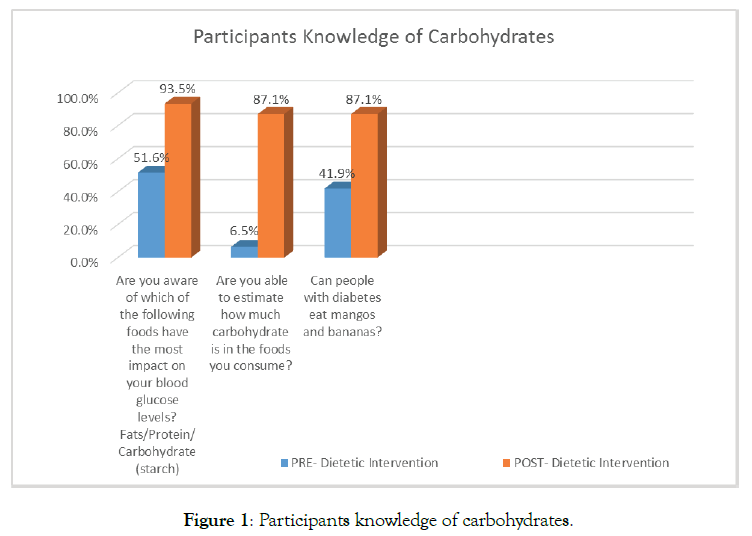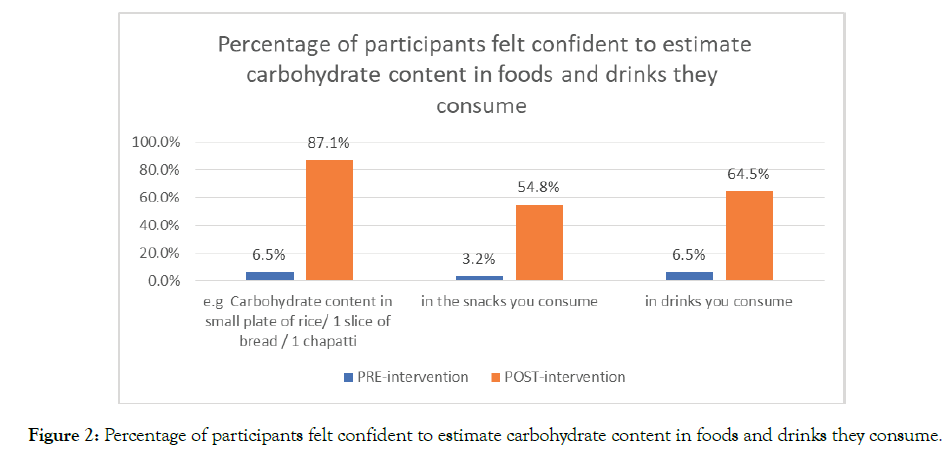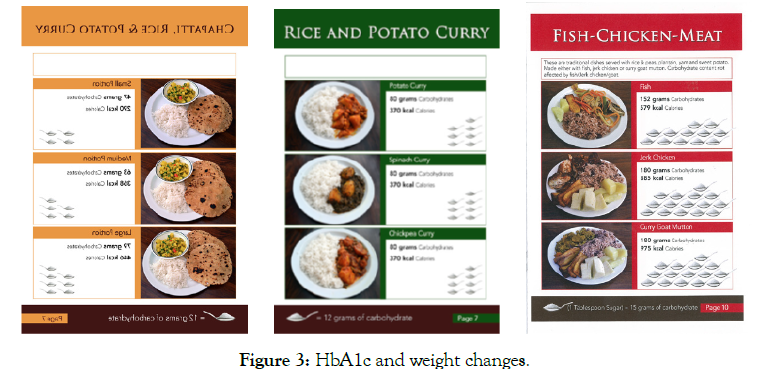Research Article - (2021) Volume 12, Issue 4
Background: Over 3 million People in the UK live with Diabetes and over 500,000 of them are from Black Asian and minority Ethnic communities (BAME) communities. BAME communities develop Type 2 Diabetes at a younger age and are disproportionally at risk of complications. Objectives This pilot study aimed to demonstrate that using a picture based, culturally relevant, dietary-  booklet to provide dietary advice for newly diagnosed (BAME) people with Type 2 Diabetes, could enable healthcare professionals to improve the knowledge and understanding of Carbohydrates in BAME communities with Type 2 Diabetes. Method Questionnaire was administered before, and after the participant’s appointment with a Dietician to gauge participants knowledge of Carbohydrates. The newly designed booklets depicted foods commonly eaten by three specific communities prevalent in NW London those of the Gujarati, Caribbean and Pakistani communities. The Carbohydrate content of the foods in the booklets was represented as sugar spoons equivalents, to enable the participants to have a visual representation of the Carbohydrate content of their commonly eaten foods. Aim Using a simple method of sugar spoon equivalents and depicting culturally relevant, and specific foods would enable a better understanding of the carbohydrate content in food in these communities that could be used a tool to facilitate improved self-management of their Type 2 Diabetes. Results The participant's  ability to estimate the Carbohydrate content of foods, snacks and drinks pre and post the intervention showed consistent improvement, as did their confidence in estimating the carbohydrate content of foods.
Carbohydrate awareness; Diet; Ethnic Health; Type 2 Diabetes
1) There are over 3 million people in the UK living with Diabetes
2) At least 500,000 of these are from Black, Asian and minority Ethnic (BAME) communities
3) In BAME communities, Type 2 Diabetes:
4) Has a higher prevalence than in the Caucasian community in the UK and develops at a younger age.
5) BAME communities are at disproportionately greater risk of developing complications [1]
6) Dietary advice is the cornerstone of management or Diabetes and is recommended for everyone with Diabetes at diagnosis [2], and throughout the lifelong journey with Diabetes.
7) Dietary advice aids self-management, and for BAME communities with Type 2 Diabetes, culturally relevant and specific interventions has been shown to improve diabetes related outcomes [3-5].
8) Carbohydrates are the food group that have the maximum effect on blood glucose.
9) There is a lack of studies demonstrating the level of understanding of Carbohydrates in BAME people who have Diabetes in the UK.
Objective
This pilot study aimed to demonstrate an improved understandingof Carbohydrates in newly diagnosed BAME people with Type 2 Diabetes, with the use of a picture based culturally relevant dietary booklet to provide dietary advice.
Recently diagnosed, Asian or Black adult Patients with Type 2 Diabetes attending an intermediary, integrated care Clinic in North West London between February and March 2017, were invited to participate in the pilot study
A questionnaire, (example questions given below) was administered to examine the knowledge and understanding of Carbohydrates in these two ethnic groups. The responses to the questionnaire before, and after education with a novel dietary resource were compared, and analysed, in order to further the understanding of the current situation in BAME communities. Three culturally specific dietary booklets designed, and based on Gujarati, Caribbean and Pakistani foods, formed the basis of the dietary education and intervention. The booklet uses tablespoons of sugar alongside a picture of a food, or a meal to represent the carbohydrate content.
Separate investigators were used in providing education or administering the questionnaires. Data was analysed using IBS SPSS statistics version24. We employed McNemar statistical test to test for the difference in responses pre,and post the intervention.
• There were 31 Participants of a Black or Asianminority ethnicity included in the Study.
• The majority of the Participants (51.6%) did not recall having received any dietary education prior to their attendance at the clinic this is despite the diagnosis of Diabetes occurring in primary care.
• 80.6% of people had not received culturally relevant dietetic advice prior to the intervention
• Following the interventiontheparticipants: gained more knowledge about the impact of Carbohydrates as the food group that had most impact on their blood glucose , andThe participants were better able to recognise Carbohydrates in the food they commonly eat (see Figure 1).

Figure 1: Participants knowledge of carbohydrates.
The majority of Participants were unable to estimate the Carbohydrate content of culturally relevant foods, snacks or drinks prior to the intervention, but this was statistically significantly improved following the intervention (Figure 2).

Figure 2: Percentage of participants felt confident to estimate carbohydrate content in foods and drinks they consume.
This pilot study used a novel, culturally relevant, dietary booklet to inform Black and Asian minority ethnic communities with Type 2 Diabetes, about the carbohydrate content in their food. The results show that the use of this culturally relevant booklet improved the knowledge and confidence of BAME communities to recognise Carbohydrates in the food or drink they normally eat and also to recognise that Carbohydrates are the food group that has the most impact on their blood glucose and therefore their diabetes control. This knowledge and confidence can provide individuals with the information they require to facilitate better self-care and to empower BAME communities to make healthier food choices.
The study highlights two issues which are of concern: the lack of baseline dietary advice, and culturally relevant dietary advice given to the majority of the participants by healthcare professionals, when it is known that dietary advice is critical for all people recently diagnosed with Type 2 Diabetes, and culturally relevant interventions improve the outcome of BAME groups with Diabetes.
The current pilot study did not directly compare this new resource with existing resources but enabled us to gain a baseline understanding of the current level of knowledge, and competence of BAME communities with regards to Carbohydrates in the food they normally eat.
Future studies will compare this booklet to the existing resources and also examine clinical outcomes such as HbA1c and weight changes as well as patients food choices (Figure 3).

Figure 3: HbA1c and weight changes.
This pilot study demonstrates that using a culturally focussed and appropriate, pictorial booklet to provide dietary education to BAME communities with Type 2 Diabetes, can significantly improve the knowledge of these communities with regards to Carbohydrates in the food they commonly eat.
This improved knowledge could empower communities to make informed food choices, aiming for improved self- management.
More studies are needed to ascertain how this utilised to produce Figure 1:
improved clinical outcomes and to build on this evidence to further improve the situation for disadvantaged BAME communities with Type 2 Diabetes.
Citation: Mehar S, St John J, Pillar A, Crawford J, Power B, Wittekind A. (2021) Connecting Nursing Students with E-Learning: Challenges for Nursing Educators- A Way Forward? J Diabetes Metab. 12:874.
Received: 17-Jul-2020 Published: 25-May-2021, DOI: 10.35248/2155-6156.21.12.874
Copyright: © 2021 Mehar S, et al. This is an open access article distributed under the terms of the Creative Commons Attribution License, which permits unrestricted use, distribution, and reproduction in any medium, provided the original work is properly cited.